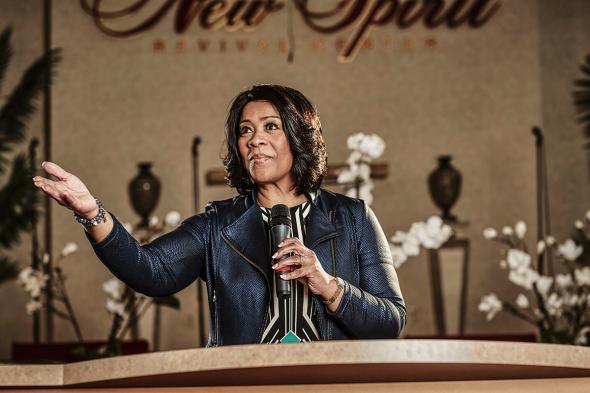Like fortune, reality TV favors the bold. So when I say that the women on Lifetime’s new “docuseries” Preach, which debuts Friday night, are bold, I mean that they are bold by the standards of an aesthetic tradition in which telling a fellow cast-member you would leave them to be eaten by vultures is now considered somewhat quaint. But in Preach’s first episode alone, its stars claim to have predicted Hurricane Katrina, and to have raised people from the dead. One calls herself “the Beyoncé of the gospel.” They all claim to speak directly on behalf of God.
Lifetime has been carving out a niche with religion-based reality shows like Preachers’ Daughters and The Sisterhood. Its latest, Preach, follows four self-declared “prophetesses” who preach in the charismatic tradition: laying on hands, speaking in tongues, casting out demons, and so on. On the surface, it’s a less-coherent version of Real Housewives, just another reality show about ambitious cat-fighting narcissists. And don’t get me wrong: It is. But if you watch it, you’ll get an unusual look at the entrepreneurial side of American religious culture, and the self-made women who thrive there.
The first episode of Preach (the only one available to critics in advance) is built around the planning of a major “deliverance service” at the New Spirit Revival Center in Cleveland, run by prophetess Belinda Scott and her husband. The service is essentially an old-time revival, with rousing sermons and dramatic calls for repentance and healing. It doesn’t take a prophet to guess what happens. Will Belinda raise someone from the dead? Will witches “manifest”? Will Prophetess Linda Roark (“the blue-eyed soul sister”) mildly annoy the other prophetesses by walking on top of chairs? Unfortunately for viewers, only one of these things happens.
It would be easy to call these women hucksters. But they’re also hustlers, in the great American tradition of Joel Osteen, Jim and Tammy Faye Bakker, and Aimee Semple McPherson, the early 20th-century evangelist who preached and performed faith healings in front of enormous adoring crowds. They publish their own work, and relentlessly promote their personal brands via radio, television, and merchandise for sale on their garish websites. Few, if any of them, seem to have formal support from larger denominations or other institutions. Unfortunately, the show is so muddled and context-free that it’s hard to know for sure. But whatever they’re doing, it seems to be paying off in the form of jewelry, McMansions, and supernatural levels of self-confidence. As Scott tells her protégé inside her own walk-in closet, “I didn’t get this because I’m a pastor, I got this because I’m a hard worker.”
Not all entrepreneurialism is noble, a fact which should be obvious to all but the most devoted acolytes of the church of Silicon Valley. The women of Preach seem to be preaching to—or preying on—true believers without many resources to spare. But it’s hard not to admire them at least a little for building their own empires and unabashedly reveling in their own power. “As a prophetess, I have the power to preach God’s word. I have the power to cure diseases, and I have the power to declare change in the earth,” one prophetess tells the camera. “That’s why I like going to the gun range.”
